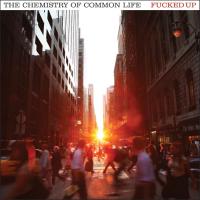
Fucked Up
The Chemistry of Common Life (2008)
Douglas Schatz
Fucked Up seems to continuously catch shit. Their old fans hate hate their new sound (three guitarists in a hardcore punk band?), while their new fans either disown or are oblivious to their older, more raw material ("Generations"? It's like one riff over and over again.). This rift can be easily seen at their shows, where fat smelly guys throw bottles at people during songs like "Police" while skinny girls in V-necks dance to "I Hate Summer." In the middle of the "mosh pit politics" stands the band's music, which, when viewed objectively, stands on its own two feet as shockingly original and incomparable punk rock. But this begs the questions: Can these two oppositional sub-cultures be united in support of any of the band's material? Is there any middle ground these two fans can agree upon? Could Fucked Up's newest album be some sort of countercultural epoxy?
The band's last full-length, Hidden World, was a veritable magnum opus of hardcore punk music: a 70+-minute long album that blended mid-tempo hardcore perfectly with indie-ish noise rock. The Chemistry of Common Life, while leaning a little more towards the "experimental noise rock" side of the spectrum, is an excellent companion to Hidden World, and a very logical next step for the band. The album opens with a flute solo and some experimental layered guitar tracks, thus setting the instrumental tone of the album. It then rockets into action with a scream from Pink Eyes (vocalist) as the first track "Son the Father" begins. The song, which is both fairly fast and definitely intense, lays down a solid jumping off point for the rest of the album.
The two main themes of The Chemistry of Common Life, organized religion and psychedelics, resound throughout the album with various connotations attached to them. As with previous Fucked Up releases, the lyrics are shockingly poetic and extremely intellectual. It's almost a shame that Pink Eyes makes the majority of them incomprehensible; however, without him the band would certainly lose much of its intensity. I would highly recommend that everyone find a copy of the lyrics to read along with the songs, as they compliment the complexity of the music.
Musically, the band is all over the place with various experiments. "Golden Seal," a brooding instrumental piece, arguably (there have been instrumental tunes on various B-sides) presents the listener with the band's foray into pure noise music. On the other end of the spectrum lies the band's first attempt at a poppy sound with one of the album's standout tracks (both musically and lyrically), "Black Albino Bones." In between those two extremes are duets ("Royal Swan"), slower melodic tunes ("No Epiphany," another standout track), and more traditional "Fucked Up" songs ("Days of Last"). While some of these experiments fall flat, the majority of them work very well. On a personal aside, I felt like the two instrumental tracks detracted heavily from the overall flow of the album, and should have been more carefully placed or even omitted. "Golden Seal" really brings the album to a screeching halt after the aural explosions of "Son the Father" and "Magic Word."
Noticeably gone is the increidbly weird instrumentation; there are no string interludes, whistling outros or violin solos on the record. Aside from the flute intro, and an almost unnoticeable French horn on "Days of Last," the expirimentalism is left entirely to the guitarists and vocalists. The presence of recently recruited third guitarist Young Governor (Ben Cook of No Warning fame) is felt throughout the album, as his presence allowed lead guitarist 10,000 Marbles to increase the number of layered guitar tracks greatly from Hidden World, giving the album both a grander feeling and a larger sense of experimentalism. Rounding out the album is the title track, a seven- minute long beast that reminded me a lot of "Vivian Girls," the closing jam of Hidden World. The track thrashes to a finish with an undulating climax of hardcore noise punk (I just made a genre), thunder (literally) and very intense screaming, which (fittingly) concludes The Chemistry of Common Life in the most grandiose fashion.
Overall, the album presents itself as a very positive next step for the band. While not quite as good as Hidden World (which will probably serve as the band's critical comparison for the rest of their career), the album definitely deserves a lot of respect. Old fans may not find the album as appealing, but I think that anyone who enjoyed the band's last full-length will find something appealing about The Chemistry of Common Life.
To conclude both the review and my opening anecdote: Is The Chemistry of Common Life the great sub-cultural uniter? No. But it is an amazing album that will undoubtably be making many a critic's year of the end list.